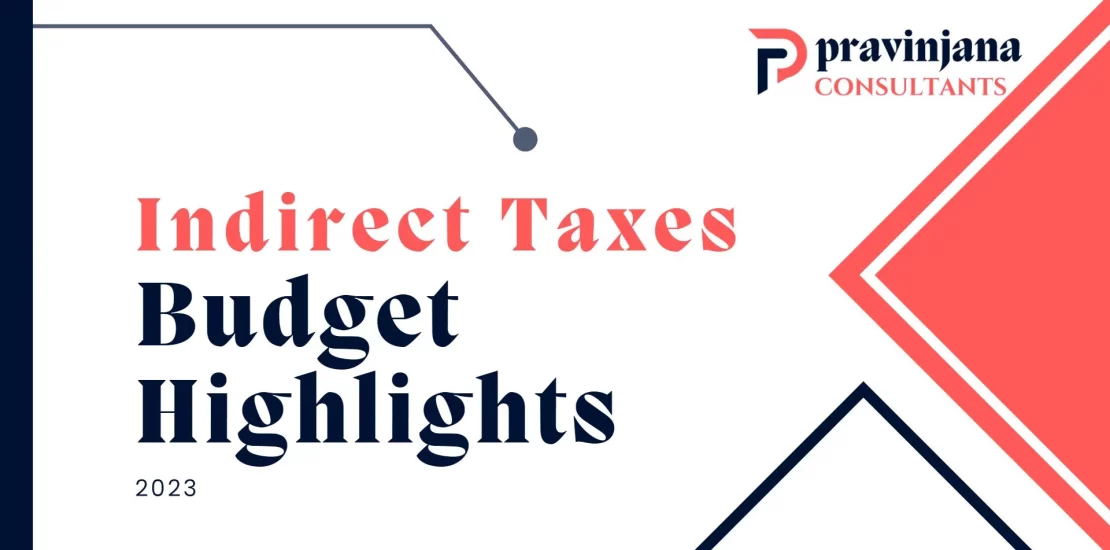- February 2, 2023
- Posted by: Pravinjana Consultants
- Category: Budget 2023

The Union Budget has been presented in the back drop of major economies experiencing moderation of growth, impacted by the pandemic, risk of economic recession in major economies and global uncertainties. India, in contrast, has stood out with growth rate of around 7%, which is the highest amongst the major economies. To address the risks tempering India’s growth, the Government’s strategy includes inclusive budgetary reforms, making India Atmanirbhar and attaining macro-economic stability.
On the Indirect Taxation front, the budget has included proposals aimed to promote exports, boost domestic manufacturing, enhance domestic value additions and encourage green energy. The proposals to slash customs duties on inputs & components for various products will boost local manufacturing and green mobility. Changes in customs duties will also help manufacturing under PLI scheme as India looks to attract global supply chains into the country. The current concessional duty on import of some items has been proposed to continue e.g lithium cells. The Basic Customs Duty (BCD) has also been exempted on some items e.g. on denatured ethyl alcohol under the ethanol blending programme. A simplified tax structure has been envisaged with fewer rates and the Basic Customs Duty rates have been reduced from 21% to 13% for goods other than textile and agricultural items.
Goods & Service Tax (GST)
- Value of exempt supply for the purpose of apportionment of credits expanded to include Supply of warehoused goods to any person before clearance for home consumption.
- Input tax credit not allowable in respect of goods or services used for activities relating to corporate social responsibility.
- Deposit of Input Tax Credit availed along with interest in cases of non-payment to suppliers within 180 days from date of issue of invoice.
- Provisions for interest on delayed refunds amended to prescribe manner of computation of period of delay for calculation of interest.
- Taxpayers supplying goods through E- commerce operator (ECOs) will be eligible to opt for composition scheme. New penal provisions made applicable in case of contravention of specified provisions.
- Option for compounding of offence not allowed on issuance of any invoice or bill without supply of goods or services or both.
- Minimum and maximum amounts for compounding of offences reduced to 25% and 100% respectively of the amount of tax involved.
- Maximum Time limit of three years prescribed for furnishing of details of outward supplies (GSTR-1), for furnishing of returns (GSTR-3B), for furnishing of Annual returns and reconciliation (GSTR 9/9C) and for furnishing of tax collected at source statement (GSTR-8).
- Provisions incorporated empowering the common portal for sharing of data furnished by taxpayers with other systems notified by Government. Such details to be shared post obtaining consent of supplier/ recipient as applicable. The Government or the common portal shall not be responsible with respect to any liability arising consequent to information shared under this section.
- In case of supply of goods to a place outside India, place of supply has been specified to be the location of person if recipient is registered and location of handing over for transportation in cases where recipient is unregistered.
Customs
- Validity period of two years shall no longer be made applicable to exemption notifications issued in relation to multilateral or bilateral trade agreements and in certain specified cases.
- Provisions related to imposition of Countervailing duty and Anti-dumping duty amended retrospectively with effect from January 01, 1995 to clarify that determination and review refers to ‘determination and review’ as prescribed under Rules. Similar amendment made in provision dealing with appeals.
